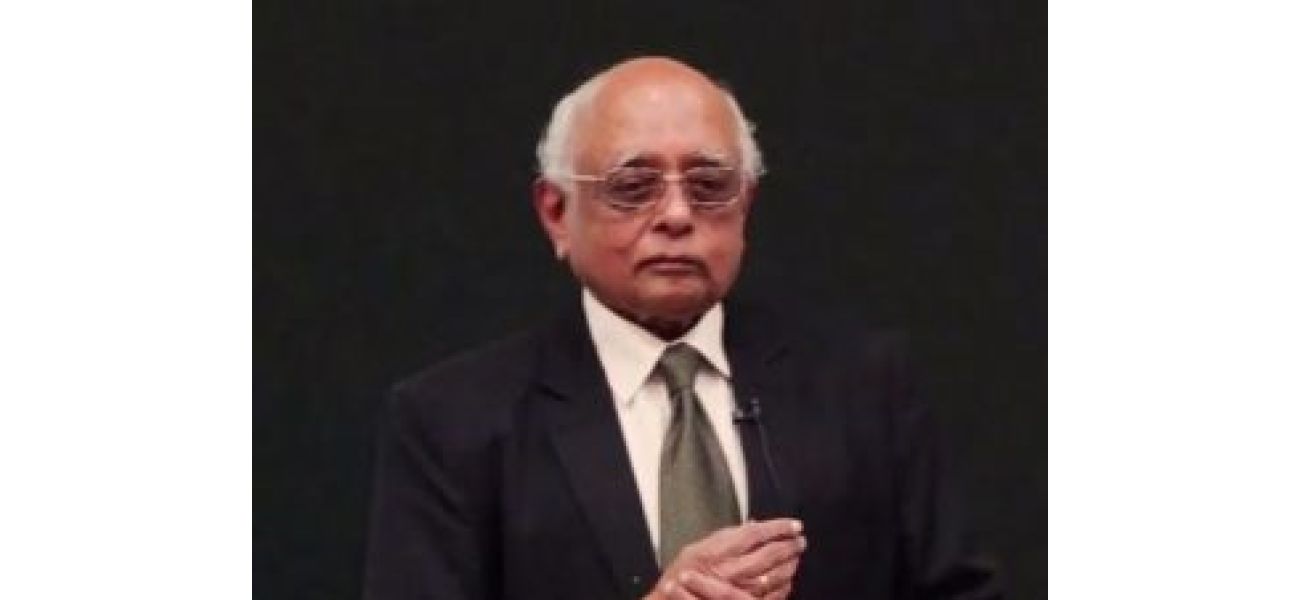Renowned nuclear scientist R Chidambaram, 88, has died.
Renowned physicist Rajagopala Chidambaram, known for his role in India's nuclear tests, passed away at 88 in Mumbai.
January 4th 2025.

Renowned physicist Rajagopala Chidambaram, who played a crucial role in India's nuclear tests of 1974 and 1998, passed away on Saturday, as confirmed by the Department of Atomic Energy. He was 88 years old. According to an official from the DAE, Chidambaram, who was also involved in the country's nuclear weapons program, breathed his last at Jaslok Hospital in Mumbai.
In an official statement, the DAE expressed their deep sorrow at the passing of Chidambaram, describing him as an exceptional physicist and one of India's most distinguished scientists. He was known for his unparalleled contributions to the country's scientific and strategic capabilities, as well as his visionary leadership in the field of science and technology.
Born in 1936, Chidambaram was an alumnus of Presidency College in Chennai and the Indian Institute of Science in Bengaluru. Throughout his career, he held several prestigious positions, including the Principal Scientific Adviser to the government of India, Director of Bhabha Atomic Research Centre, Chairman of Atomic Energy Commission, and Secretary to the government of India, DAE. He also served as the Chairman of the Board of Governors of the International Atomic Energy Agency.
Chidambaram played a crucial role in shaping India's nuclear capabilities. As noted in the statement, he was instrumental in the country's first nuclear test in 1974 and led the DAE team during the Pokhran-II nuclear tests in 1998. His contributions were significant in establishing India as a nuclear power on the global stage.
Aside from his contributions to the field of nuclear science, Chidambaram was also a world-class physicist. His research in high-pressure physics, crystallography, and materials science significantly advanced the scientific community's understanding of these fields. He also played a key role in laying the foundation for modern materials science research in India.
Chidambaram was a strong advocate for utilizing science and technology for national development. He championed initiatives in various areas such as energy, healthcare, and strategic self-reliance. He also led numerous projects that greatly advanced India's science and technology landscape. He was particularly involved in the development of supercomputers and the conceptualization of the National Knowledge Network, which connected research and educational institutions across the country.
In addition to his professional achievements, Chidambaram was also honored with prestigious accolades, including the Padma Shri in 1975 and the Padma Vibhushan in 1999. He also received honorary doctorates from several universities and was a fellow of eminent Indian and international science academies.
The Secretary of DAE, Ajit Kumar Mohanty, described Chidambaram's passing as an irreparable loss. He praised him as a pioneer in the field of science and technology, whose contributions greatly enhanced India's nuclear prowess and strategic self-reliance. The DAE also expressed their heartfelt condolences to Chidambaram's family and loved ones during this difficult time.
Chidambaram will be remembered as a trailblazer, an inspirational leader, and a dedicated mentor to countless scientists and engineers, according to the DAE. The nation mourns the loss of a true visionary and his legacy will continue to inspire future generations.
In an official statement, the DAE expressed their deep sorrow at the passing of Chidambaram, describing him as an exceptional physicist and one of India's most distinguished scientists. He was known for his unparalleled contributions to the country's scientific and strategic capabilities, as well as his visionary leadership in the field of science and technology.
Born in 1936, Chidambaram was an alumnus of Presidency College in Chennai and the Indian Institute of Science in Bengaluru. Throughout his career, he held several prestigious positions, including the Principal Scientific Adviser to the government of India, Director of Bhabha Atomic Research Centre, Chairman of Atomic Energy Commission, and Secretary to the government of India, DAE. He also served as the Chairman of the Board of Governors of the International Atomic Energy Agency.
Chidambaram played a crucial role in shaping India's nuclear capabilities. As noted in the statement, he was instrumental in the country's first nuclear test in 1974 and led the DAE team during the Pokhran-II nuclear tests in 1998. His contributions were significant in establishing India as a nuclear power on the global stage.
Aside from his contributions to the field of nuclear science, Chidambaram was also a world-class physicist. His research in high-pressure physics, crystallography, and materials science significantly advanced the scientific community's understanding of these fields. He also played a key role in laying the foundation for modern materials science research in India.
Chidambaram was a strong advocate for utilizing science and technology for national development. He championed initiatives in various areas such as energy, healthcare, and strategic self-reliance. He also led numerous projects that greatly advanced India's science and technology landscape. He was particularly involved in the development of supercomputers and the conceptualization of the National Knowledge Network, which connected research and educational institutions across the country.
In addition to his professional achievements, Chidambaram was also honored with prestigious accolades, including the Padma Shri in 1975 and the Padma Vibhushan in 1999. He also received honorary doctorates from several universities and was a fellow of eminent Indian and international science academies.
The Secretary of DAE, Ajit Kumar Mohanty, described Chidambaram's passing as an irreparable loss. He praised him as a pioneer in the field of science and technology, whose contributions greatly enhanced India's nuclear prowess and strategic self-reliance. The DAE also expressed their heartfelt condolences to Chidambaram's family and loved ones during this difficult time.
Chidambaram will be remembered as a trailblazer, an inspirational leader, and a dedicated mentor to countless scientists and engineers, according to the DAE. The nation mourns the loss of a true visionary and his legacy will continue to inspire future generations.
[This article has been trending online recently and has been generated with AI. Your feed is customized.]
[Generative AI is experimental.]
0
0
Submit Comment





